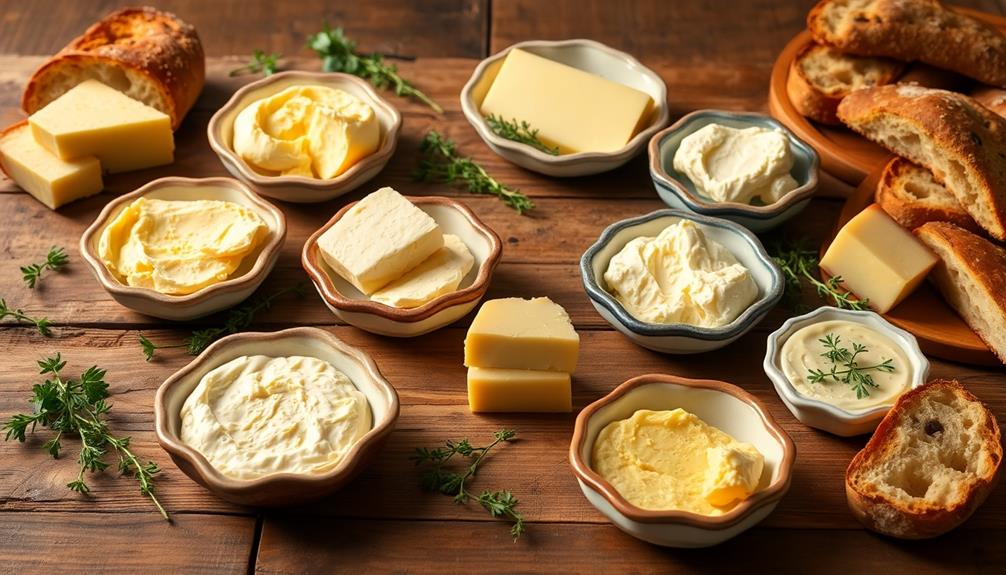Were you aware that substituting butter for vegetable oil can infuse your recipes with a deep and delicious flavor? By utilizing the correct substitution proportions, you effortlessly elevate the taste of your culinary creations.
In this article, I will guide you through the benefits of using butter, factors to consider, and provide you with helpful tips and delicious recipes. So, let’s dive in and explore how much butter you should use to substitute for vegetable oil.
Key Takeaways
- Butter adds rich flavor to dishes and enhances the taste of baked goods, sauces, and sautés.
- Butter contains important nutrients like vitamins A, D, and E.
- Butter is high in saturated fat, which can increase cholesterol levels, whereas vegetable oil is low in saturated fat and a good source of vitamin E.
- When substituting butter for vegetable oil, consider factors such as smoke point, flavor, texture, and nutrition.
Benefits of Using Butter as a Substitute for Vegetable Oil
If you’re looking for a healthier option, using butter as a substitute for vegetable oil has its benefits. One of the main advantages of using butter is the rich flavor it adds to your dishes. It can enhance the taste of baked goods, sauces, and sautés.
Butter also contains important nutrients like vitamins A, D, and E, as well as essential fatty acids. However, it’s important to note that butter is high in saturated fat, which can increase cholesterol levels.
On the other hand, vegetable oil is low in saturated fat and contains heart-healthy unsaturated fats. It’s also a good source of vitamin E.
When deciding between butter and vegetable oil, consider the nutritional differences and choose the option that best suits your dietary needs.
Factors to Consider When Substituting Butter for Vegetable Oil
When substituting butter for vegetable oil, it’s important to consider various factors. Here are four factors to consider and the best types of butter to use:
-
Smoke Point: Butter has a lower smoke point compared to vegetable oil. This means that it can burn at higher temperatures, resulting in a charred or bitter taste. To avoid this, use clarified butter (ghee) or European-style butter, which have higher smoke points.
-
Flavor: Butter adds a rich and distinct flavor to dishes. Consider whether this flavor will complement or overpower your recipe. For neutral or savory dishes, unsalted butter works best. For sweet or baked goods, opt for salted butter.
-
Texture: Butter is solid at room temperature and can affect the texture of your dish. When substituting, use melted butter for liquid oils and softened butter for solid fats like shortening or lard.
-
Nutrition: Butter contains saturated fats, while vegetable oils are often low in saturated fats. Consider your dietary needs and choose the best type of butter accordingly.
Considering these factors will help you make an informed decision when substituting butter for vegetable oil. Now, let’s explore the conversion ratio for this substitution.
Conversion Ratio for Substituting Butter for Vegetable Oil
To determine the conversion ratio for substituting butter, consider the amount of oil called for in the recipe and multiply it by 0.8. This simple calculation will give you the appropriate amount of butter to use as a substitute.
But why would you want to use butter instead of vegetable oil in baking? Well, besides the delicious flavor it adds to your baked goods, butter offers several health benefits over vegetable oil.
Butter is a natural source of vitamins A, D, E, and K, which are important for overall health. It also contains healthy fats that can help improve brain function and support heart health. So, not only will your baked goods taste better with butter, but they will also be a healthier choice.
Now, let’s move on to some tips for successfully substituting butter for vegetable oil in recipes.
Tips for Successfully Substituting Butter for Vegetable Oil in Recipes
There are several tips you can follow to successfully use butter instead of vegetable oil in recipes. Here are four helpful suggestions:
-
Adjust Cooking Times: Butter has a lower smoke point than vegetable oil, which means it can burn at higher temperatures. To avoid this, reduce the cooking temperature by 25 degrees Fahrenheit and keep a close eye on your dish while cooking.
-
Use the Right Amount: When substituting butter for vegetable oil, use a 1:1 ratio. For example, if a recipe calls for 1 cup of vegetable oil, use 1 cup of melted butter instead.
-
Avoid Mistakes: One common mistake is using salted butter when the recipe doesn’t call for it. This can alter the flavor of your dish. Another mistake is not properly creaming the butter when necessary, which can affect the texture of baked goods.
-
Experiment and Adjust: Every recipe is different, so don’t be afraid to experiment and adjust. Start with a smaller amount of butter and gradually increase it if needed. Pay attention to the texture, taste, and cooking time to achieve the best results.
Delicious Recipes That Use Butter as a Substitute for Vegetable Oil
Using butter instead of vegetable oil in recipes can add a rich and flavorful twist to your favorite dishes. Not only does butter enhance the taste of your food, but it also has a significant impact on the texture.
Butter’s higher fat content compared to vegetable oil can lead to a softer and more tender baked goods. It can create a creamy and velvety consistency in sauces and dressings.
When substituting butter for vegetable oil, it is important to consider the texture you want to achieve. For example, if a recipe calls for 1 cup of vegetable oil, you can use 1 cup of melted butter for a similar texture. However, if you prefer a slightly lighter texture, use 3/4 cup of melted butter instead.
Experimenting with butter as a flavorful alternative to vegetable oil can elevate your cooking and baking to new heights.
Frequently Asked Questions
Can I Substitute Butter for Vegetable Oil in Any Recipe?
Yes, you can generally substitute butter for vegetable oil in most recipes. However, keep in mind that butter has a different taste and consistency, so it may alter the flavor and texture of the final dish.
Will Using Butter Instead of Vegetable Oil Affect the Texture of Baked Goods?
Using butter instead of vegetable oil in baking may affect the texture of baked goods. Butter contains more water and less fat than vegetable oil, resulting in a different texture.
Can I Use Salted Butter as a Substitute for Vegetable Oil?
Using salted butter as a substitute for vegetable oil in baking can alter the texture and flavor. While it may add richness and depth, the added salt content should be considered. It’s best to follow a recipe or consult a baking expert.
How Does the Flavor of Butter Compare to Vegetable Oil in Recipes?
In terms of flavor, butter offers a rich and distinct taste compared to vegetable oil. To achieve the same texture in baked goods, use an equal amount of melted butter as a substitute.
Are There Any Health Benefits or Drawbacks to Using Butter Instead of Vegetable Oil?
Using butter instead of vegetable oil can have health implications due to its higher saturated fat content. Nutritional differences between the two include varying levels of vitamins and antioxidants.
Conclusion
In conclusion, substituting butter for vegetable oil can be a game-changer in your recipes. It adds a rich and indulgent flavor and provides added health benefits.
With the right conversion ratio and some helpful tips, you can easily make the switch without compromising the taste and texture of your dishes.
So why not give it a try and let your culinary adventures take flight with the golden goodness of butter?
Remember, a little butter goes a long way in adding that extra touch of magic to your creations.










